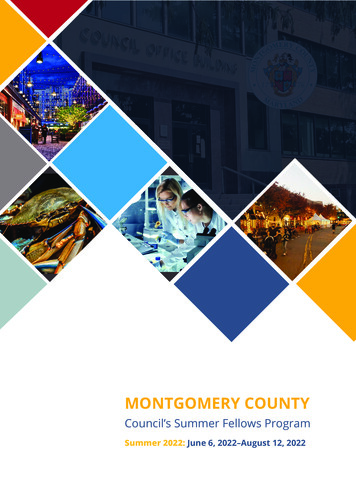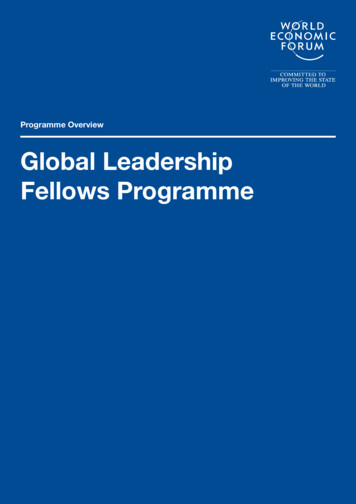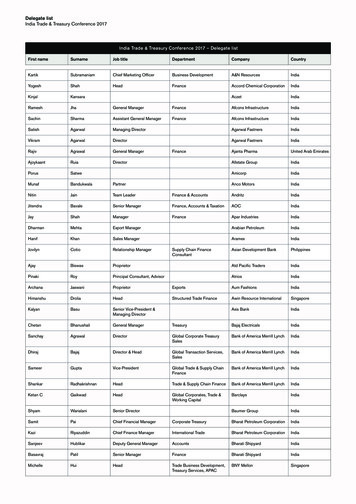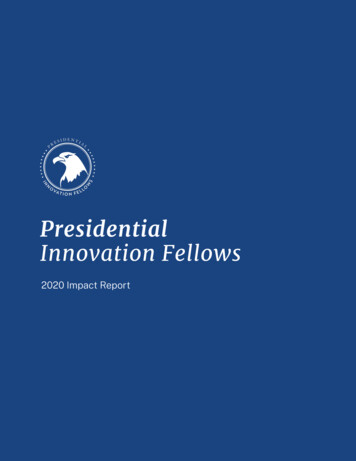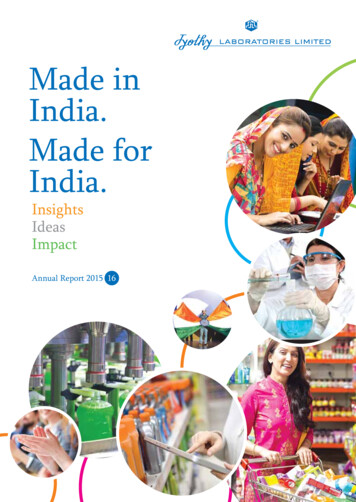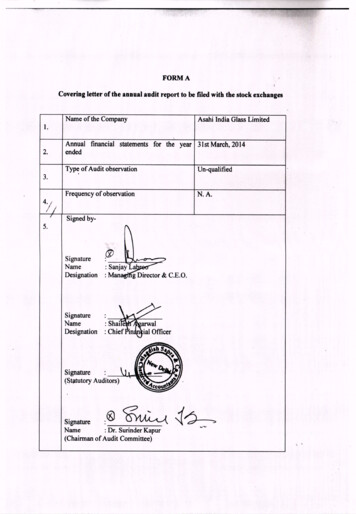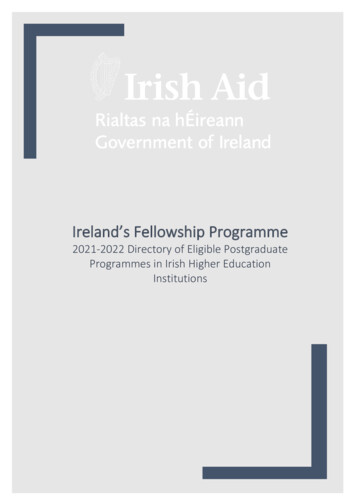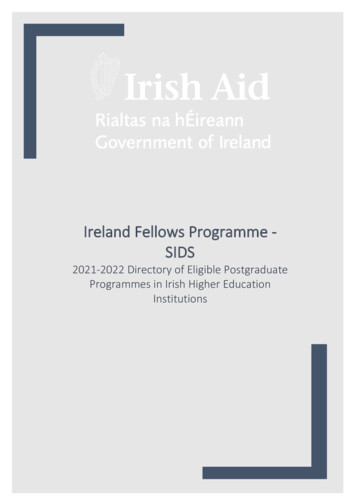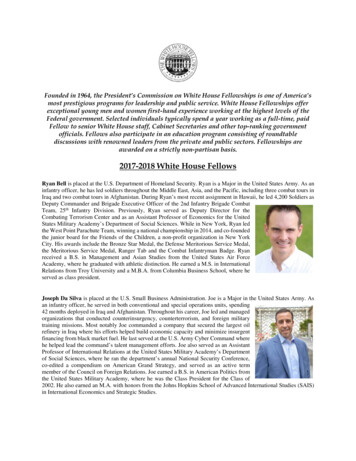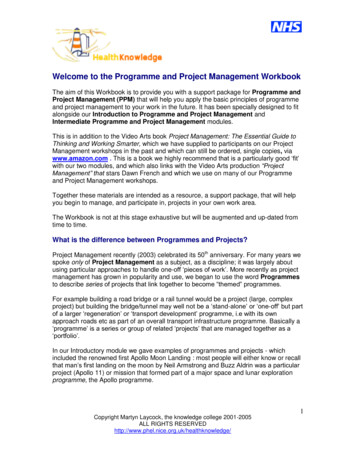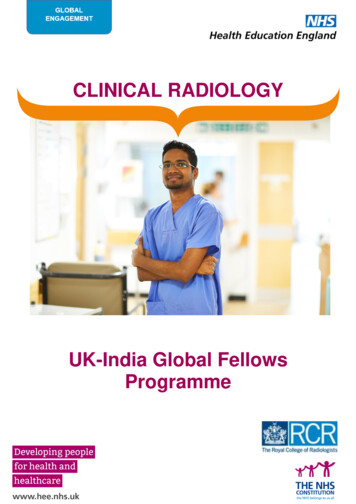
Transcription
CLINICAL RADIOLOGYUK-India Global FellowsProgramme
CLINICAL RADIOLOGY GLOBAL FELLOWSINTRODUCTIONHealth Education England’s Global Learners Programme (GLP) is working with healthcare providersglobally to improve the quality and volume of the NHS workforce through global education and workplaceexchanges.The Global Learners Programme offers an educational programme for healthcare workers from othercountries who would like to spend three years in the UK on an earn, learn and return scheme. Theprogramme will create dynamic partnerships and build lasting relationships with global healthcareorganisations and healthcare professionals alike.UK healthcare can learn from global learners, who will bring their experience with them. Whilst in the UKthey will gain new knowledge and skills and return to lead developments in healthcare in their homecountries. The programme will focus effort on the introduction of healthcare professionals in the UK,support while they are in the UK and integration of professionals back into their home clinical setting.The GLP is creating opportunities for global education and training for NHS current and future workforcesand is participating in the development and delivery of collaborative international projects, to addresscurrent workforce pressures and promote continual transformation. Historically clinicians from allhealthcare professions have gained international experience through volunteering, exchanges andstructured placements. GHE is actively creating better, more innovative and novel training environmentsthat build and develop international best practice and promote life-long learning.The effect should be improved, high-quality and effective services leading to more compassionate care inall settings, not only in our own healthcare setting but those of the participating countries.This Global Fellows Programme, as part of the wider Cancer Programme International Training scheme,is designed to support the development and learning of healthcare professionals who have experiencecaring for people with cancer. This is a key priority for the NHS in England and a growing priority for manycountries around the world. The National Cancer Transformation Board have published a wide range ofspecific steps designed to increase prevention, speed up diagnosis, improve the experience of patientsand help people living with and beyond the disease in Achieving World Class Cancer Outcomes: Takingthe strategy forward.GLOBAL FELLOWS PROGRAMME - OVERVIEWThe Global Fellows Programme is a collaborative development between the NHS (through HealthEducation England), the Royal College of Radiologists and Apollo Hospitals. This programme is part of awider Cancer Programme International Training scheme. The Global Fellows Programme for clinicalradiology aims to provide a route for independently competent radiologists in general duties to work in theNHS on an 'Earn, Learn, Return' basis for a period of 3 years, in order to develop a specialist interest whiledelivering service work. Such a role would be ideally suited to those who have worked in radiology for atleast 5 years and completed DNB or equivalent and subsequently FRCR.Global Fellows will undertake a mixture of general radiology and subspecialty work during both core hoursand on call. The expectation is that they will spend 60% of their time on general radiological duties, withthe remainder devoted to developing a specialty interest through a mixture of supervised service work andlearning opportunities. For 20% of their time, they will have no service delivery expectations, allowing theprogramme to be tailored to their individual needs for learning and development or to undertake a widerrange of work, such as development of new services, research, clinical governance, training and/ormanagement.2
CLINICAL RADIOLOGY GLOBAL FELLOWSThis post is not intended to promote migration; it is on a 3-year fixed term basis, and as it is not intendedfor trainees it does not attract a National Training Number (NTN).The Clinical Radiology departments we are working with offer flexible working patterns to supportcandidates developing specialist interests in line with their individual development plan. They will alsoprovide a mentor and/or training to support ongoing professional development, as well as pastoralcare/support through organisational networks.INDICATIVE JOB PLANGlobal Fellows will be appointed on a full-time basis to work an average of 40 hours a week in the UK.They will be employed on an equivalent level to SAS (Speciality and Associate Specialist) Doctors,mirroring the national Terms and Conditions for NHS doctors.The successful candidates’ duties will consist of a mixture of general radiology and subspecialty workboth during core hours and on call.The working week is split into 4 hour blocks of time called programmed activities (PAs) and it is expectedthat the Global Fellows will work 60% (6 PAs) independently delivering direct clinical care (DCC) and have40% (4 PAs) of their time available as supporting professional activities (SPAs) to further their chosenspecialist radiological interests.During DCC time Global Fellows will be working independently performing general departmental NHSservice work similar to that which they will already have performed, including reporting plain X rays,ultrasound, general CT, and any MR or interventional work they are confident to perform independentlybased on their previous experience. This may include contributing to multidisciplinary team meetings andit is expected that their capabilities will evolve during the 3-year appointment.Within the Supporting Professional Activity (SPA) time appointees will be able to acquire sub specialistskills by; Attending appropriate MDTMs of educational value to them and, with support, gradually to learn howto present the radiology at such meetings under the supervision of the specialist consultant radiologistin charge of those meetings. These meetings may be held locally or regionally and regional attendanceby video conference or by traveling to a different site will be supported when appropriate.Undertaking self-directed e-learning, for example from the RCR website and ESR website.Undertaking departmental audits and other quality improvement activity facilitated by the suggestedaudit templates on the RCR website, by the ISAS (Imaging Services Accreditation Service) standardsand by suggestions from the Trust and local consultant radiologists.Increasing their exposure as observers to radiological work such as nuclear medicine or PET-CTreporting where they may feel they lack adequate experience.Keeping log books of anonymised reports they have issued and notes of reflective practice.Completing assessments of their practice as is useful after discussion with their mentor.Writing preliminary reports on complex studies in their chosen specialist area of radiology (e.g. for anaspiring GI radiologist – MR studies investigating fistula-in-ano, rectal MR, liver MR etc.), prior todiscussing appropriate studies and having the reports checked and if necessary corrected by aconsultant radiologist with a specialist interest in this field – in the same way that a senior radiologytrainee would have his/her reports checked/corrected.Attending specialist sessions in a local specialist centre.Attending appropriate courses or conferences.For candidates with an interest in medical education or research relevant opportunities to develop thisinterest together with an accredited qualification could be made available.3
CLINICAL RADIOLOGY GLOBAL FELLOWSEMPLOYMENT OFFERGlobal Fellows will be appointed on a 3-year fixed-term contract. The key terms and conditionsare set out below: Global Fellows will be remunerated in year one at a salary in the region of 74,280 per annum (risingto 79,576 in year 3).Their Job Plan will comprise of 6 DCCs and 4 TPAsEffective development and mentorship in areas of specialist interestAn allowance of up to 8,000 (tax free) will be available to support relocation expenses. This will bepaid after appointment on production of receipts.6 weeks paid holiday and 10 days funded study leave per annum.Support to find and secure appropriate accommodation.Support to find appropriate schooling for school age dependents.Administrative support to manage arrangements and pastoral concerns, providing and supportingeffective working.Trusts working with the Global Fellows programme offer flexible working patterns to candidates includingpart time working, working remotely and flexibility of travel.All radiologists are required to be registered with the General Medical Council (GMC) and to engage inappraisal and revalidation.SELECTION AND ONBOARDINGRecruitment, selection and induction will be undertaken in India jointly between Apollo Hospitals (as thelocal partner) and NHS Trusts. The selection process will utilise a combination of face-to-face interviewsand competence assessments. Successful candidates will be matched to NHS trusts that can support thedevelopment of the specialty interest.It is envisaged that prior to Global fellows commencing work in the UK, they will be supported through amonth-long induction programme in India which will focus principally on cultural acclimatisation to theNHS and equipping the candidates with the ability to 'hit the ground running' clinically on arrival in the UK.The induction will also develop appropriate support strategies for whilst they are in the UK, to build on theirexisting technical competence.The induction programme will cover a range of topics such as:Life and work in the UK NHS values and NHS Constitution.Good Medical Practice.Continuing professional development including audit and quality improvement.Appraisal and Revalidation.Contracts and job plans.Supporting professional activities.Provision of interventional radiology services.RIS/PACS systems and voice recognition.Structuring radiology reports.Radiation protection regulations.4
CLINICAL RADIOLOGY GLOBAL FELLOWSValues and Behaviours Expected standards of behaviour.Customer service (how to treat patients).Interacting with clinicians and MDT meetings.Informed consent.Intimate examinations and use of chaperones.Team Working Working within a multi-disciplinary team.Working with medical and non-medical colleagues.Roles and responsibilities of a clinical radiologist.Governance Patient confidentiality and information governance.Raising concerns and challenging colleagues.Managing clinical incidents.Concept of ‘discrepancy’ and using these for learning.Conditions during induction will be as close to those within the NHS as possible and as well as using amixture of local, UK experienced and currently UK-based staff.During this time mentorship will be developed with appropriate NHS experienced and subspecialty trainedradiologists. Support will be available both initially from a radiologist based in India and also subsequentlywith one based in the UK. Contact with both may be facilitated prior to starting in the NHS if appropriateand ongoing contact will be encouraged as appropriate during their employment.It is hoped that support from the Indian diaspora will be available and following initial conversations withthe British Association of Physicians of Indian Origin (BAPIO) it is hoped that they will facilitate this.In addition, part of the pastoral support offered to candidates through orientation to the UK, the inductionprocess will identify any specific interests and requests for each candidate in order to offer bespokeintroduction to appropriate local contacts, whether they be faith, cricket, another sport or hobby related.KEY STAKEHOLDERSHealth Education England1Health Education England (HEE) supports the delivery of excellent healthcare and healthimprovement to the patients and public of England by ensuring that the workplace of today andtomorrow has the right numbers, skills, values and behaviours at the right time and in the rightplace.HEE is an Executive Non-Departmental Public Body (NDPB) and an arm’s-length body (ALB) ofthe Department of Health and Social Care. Its role is to provide system-wide leadership andoversight for workforce planning, education and training across England.1https://www.hee.nhs.uk/5
CLINICAL RADIOLOGY GLOBAL FELLOWSMaking sure that patients receive the best quality care across the NHS, the independent sectorand public health is at the heart of everything HEE does. It funds the highest quality educationand training at both undergraduate and postgraduate levels - resulting in world class healthprofessionals working together for the benefit of patients.As well as planning for and training our future workforce, we are committed alongsideemployers and other stakeholders to the development of our current workforce.Royal College of Radiologists2The Royal College of Radiologists is a charity that works with their members to improve thestandard of medical practice across the fields of radiology and oncology. With faculties in twodisciplines, the College and their members benefit from a fuller understanding of medical practice,across the spectrum of diagnosis and treatment.They collaborate impartially with their members and external parties from across the medicalindustry, refining the latest research and guidelines into relevant applications for radiologists andoncologists. This work can be carried out efficiently because resources and processes are sharedacross their two faculties.This enables them to educate and support doctors effectively throughout their career, providingpractical guidance, training and assessment. In turn, input from their members, through academiccontributions, professional consultation and mentorship, drives the College forward.Together, they have been contributing to the advancement of each new generation of doctors forover 40 years.Apollo3Apollo Hospitals was established in 1983 by Dr. Prathap C Reddy. It was India’s first corporatehospital and is acclaimed for pioneering the private healthcare revolution in the country. Sincethen, Apollo has risen to a position of leadership and has emerged as Asia’s foremost integratedhealthcare services provider. It has a robust presence across the healthcare ecosystem, includingHospitals, Pharmacies, Primary Care & Diagnostic Clinics. The Group also has Telemedicineunits across 10 countries, Health Insurance Services, Global Projects Consultancy, MedicalColleges, Medvarsity for E-Learning, Colleges of Nursing and Hospital Management and aResearch Foundation. In addition, 'ASK Apollo' - an online consultation portal and Apollo HomeHealth provide the care continuum.The cornerstones of Apollo's legacy are its unstinting focus on clinical excellence, affordablecosts, technology and forward-looking research & academics. Apollo Hospitals was among thefirst few hospitals in the world to leverage technology to facilitate seamless healthcare deliverythrough electronic medical records, hospital information systems and telemedicine-basedoutreach initiatives. The organization embraced rapid advancement in medical equipment’sworldwide and pioneered the introduction of several cutting edge innovations in India. Soon thecountry's first-ever Proton Treatment Cancer Centre will be launched by Apollo, and it will serveover 3 billion ospitals.com/6
The Global Fellows Programme for clinical radiology aims to provide a route for independently competent radiologists in general duties to work in the NHS on an 'Earn, Learn, Return' basis for a period of 3 years, in order to develop a specialist interest while . Its role is to provide system-wide leadership and oversight for workforce .
